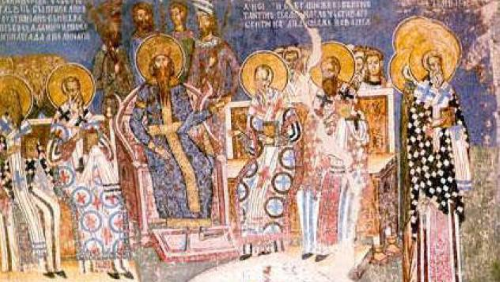Sunday of the 630 God-bearing Fathers of the Fourth Ecumenical Council in Chalcedon

Celestial stars of the spiritual realm, enlighten my mind with your rays.
Every year, between July 13th and 19th, the Orthodox Church commemorates the Fourth Ecumenical Council, held in Chalcedon in 451 AD, which was convened to address the Monophysite controversy. On this particular Sunday, the Church honors the memory of the 630 God-bearing Fathers who participated in this significant council.
The Fourth Ecumenical Council was summoned in Chalcedon under the reign of Emperors Marcian and Pulcheria. It played a pivotal role in articulating Christological doctrine, condemning the heresy of Monophysitism, and addressing the administrative organization of the Church. These Fathers, as successors to the work and teachings of the holy Apostles and previous Church Fathers, convened to reaffirm the true faith and teachings of the Church.
The hymnody of the Church, in its desire to highlight their profound contributions, describes these Fathers in a beautiful doxology of the Matins: “luminous stars of the intellectual firmament, golden mouths of the Word, divine warriors of the Lord’s camp, fragrant flowers of Paradise.”
The immense work they left us through their teachings and writings, as well as their lives and deeds, constitutes a spiritual heritage, second only to the Holy Scriptures, upon which the Church calls us to build our lives.
The Gospel reading for this day is taken from Christ’s Sermon on the Mount. Its purpose is to illuminate the spiritual work of the Holy Fathers. By following God’s commandments, the Holy Fathers of the Fourth Ecumenical Council, as well as other Church Fathers, attained the knowledge of God, guiding the people of their time and subsequent generations towards the path of salvation.
Christ, addressing His disciples, declared that they are the light of the world, reflecting their relationship with Him. Christ Himself likened Himself to the light of the world, proclaiming: “I am the light of the world; he who follows Me shall not walk in darkness, but shall have the light of life” (John 8:12). As the source of light, Christ illuminates the hearts and minds of people, rescuing them from the darkness of sin.
However, mere knowledge of the truth does not save a person. One must go further and manifest this truth to others through faith and deeds. “Let your light so shine before men, that they may see your good works and glorify your Father in heaven.”
By witnessing the good works of those who follow Christ, people glorify God the Father and believe in the divinity of Jesus Christ. This fulfills the purpose of Christ’s earthly mission, which is the salvation of all humanity.
Living out the truths of faith is not treated as an abstract idea but is experienced and applied in the life of the believer. At this point, we must be cautious against the danger of self-righteousness through our works. Believers must remember that our Savior is Christ alone, not the good deeds we perform, even if they are numerous.
Good works only express our gratitude for salvation and are not a precondition or means of obtaining it. This is achieved through struggle and effort, always with God’s help.
Christ’s teachings provide a safe path leading each person to salvation. His teachings and commandments remain eternal truths, transcending time as various empires and civilizations come and go. Living them in our lives is not an unattainable goal; it is achievable if we seek the enlightenment of the Holy Spirit to live according to them.
Today’s Gospel calls us to a realization of our Christian identity. The Holy Fathers are the figures who practiced and upheld God’s will and commandments. They led the struggles to preserve the true faith, fought for equality and justice in their societies, and supported those in need.
The struggle of the Holy Fathers was transformed into action, not remaining theoretical. We are called today to emulate these Fathers, following in their footsteps as worthy continuators of their work.
Other sources mention that the commemoration of this Sunday, while primarily for the Holy Fathers of the Fourth Ecumenical Council, at times also included the Fathers of other Councils:
- 318 Fathers of the First Council in Nicaea against Arianism in 325 AD,
- 150 Fathers of the Second Council in Constantinople against the Pneumatomachi in 381 AD,
- 200 Fathers of the Third Council in Ephesus against Nestorianism in 431 AD,
- 630 Fathers of the Fourth Council in Chalcedon against Monophysitism in 451 AD,
- 165 Fathers of the Fifth Council against Origenism in 553 AD,
- 170 Fathers of the Sixth Council in Constantinople against Monothelitism in 680 AD, and
- 367 Fathers of the Seventh Council in Nicaea against Iconoclasm in 787 AD.





